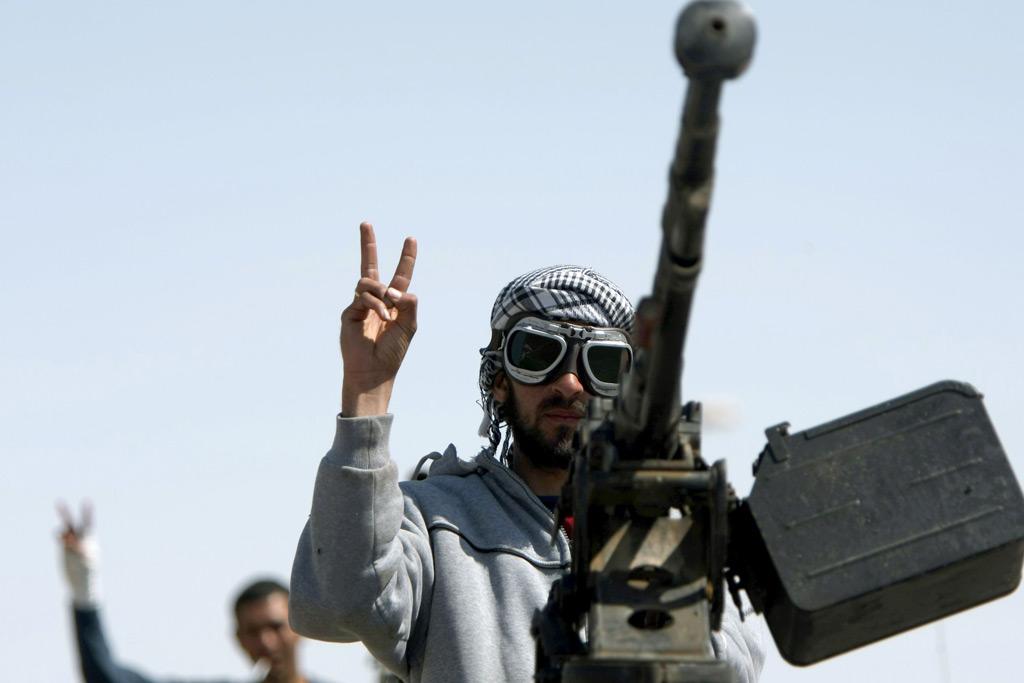NATO tries to resolve rifts over Libya as coalition agrees Gaddafi must go (VIDEO)
Libyan rebels flash the V-sign at the western gate of the eastern town of Ajdabiya, on April 13, 2011.
Diplomatic efforts to end the Libya crisis continued apace Thursday with meetings in Egypt and Germany due to address the conflict a day after talks in Doha ended with calls for Libyan leader Muammar Gaddafi's exit, but no plan to make him go.
NATO foreign ministers meeting in Berlin were expected to discuss the north African conflict amid divisions between members over the level of military intervention needed.
In Cairo, U.N. chief Ban Ki-moon was holding talks on Libya with the Arab League, the European Union, the African Union and the Organization of the Islamic Conference.
Foreign ministers from a "contact group" of Western powers and Middle Eastern countries on Wednesday issue their first joint call for an end to Gaddafi's four decade rule after meeting in Qatar.
"Gaddafi and his regime has lost all legitimacy and he must leave power allowing the Libyan people to determine the future," the group said in its final statement.
But amid disagreement among NATO allies over Libya — Britain and France notably frustrated by lack of support from other members — it offered no strategies for forcing him out.
In Berlin, ministers will attempt to forge a cohesive strategy on U.N.-mandated military action, which includes enforcing a no-fly zone and policing an arms embargo, the BBC reported.
France and Britain have been leading air strikes to attack Gaddafi's forces and defend rebels and civilians, but want more countries involved.
After a meeting between France's Nicolas Sarkozy and Britain's David Cameron in Paris, a French official said the coalition should "have all the means it needs" to thwart Gaddafi.
The call was matched by Libyan opposition rebels who urged Washington to rethink its involvement. They said Gaddafi's forces had been allowed to regroup after the United States, which briefly led the aerial assault, scaled back its mission.
"When the Americans were involved the mission was very active and it as more leaning toward protecting the civilians," Mahmoud Shamman, a spokesman for the rebel Transitional National Council told the Telegraph.
"NATO is very slow responding to these attacks on the civilians. We'd like to see more work toward protecting the civilians."
Despite it's reduced involvement, the United States disclosed Wednesday that its warplanes had, contrary to earlier claims, continued to strike Libyan targets.
Pentagon officials said 11 warplanes had flown 97 sorties to suppress Libyan air defenses since April 4, when command of the mission was handed to NATO.
But, they said, the number of missile strikes during these missions was only three. Some sorties were used to electronically jam Libyan military technology.
The Pentagon had previously said that only support aircraft in roles such as refueling and reconnaissance would be deployed over north Africa, the New York Times said.
President Barack Obama has faced a delicate balancing act over Libya in trying to fulfill NATO obligations without upsetting a public jaded by U.S. military action in Iraq and Afghanistan.
Attempting to clarify the U.S. mission, the Pentagon said its role was purely defensive. Press secretary Geoff Morrell added: “It is completely consistent with how we have described our support role ever since the transition to NATO lead.”
In Libya itself, NATO stepped up air strikes around the besieged western city of Misurata, destroying 12 of Gaddafi's tanks, the Washington Post said.
Rebels controlling the port claimed to be gaining the upper hand over government forces, but called for NATO to dispatch ground troops to avert a civilian massacre.
"Every single day, mortar shells and tank shells are falling randomly all around the city,” a rebel spokesman told the Post. “It is endless madness and carnage.”
Every day, reporters and producers at The World are hard at work bringing you human-centered news from across the globe. But we can’t do it without you. We need your support to ensure we can continue this work for another year.
Make a gift today, and you’ll help us unlock a matching gift of $67,000!
